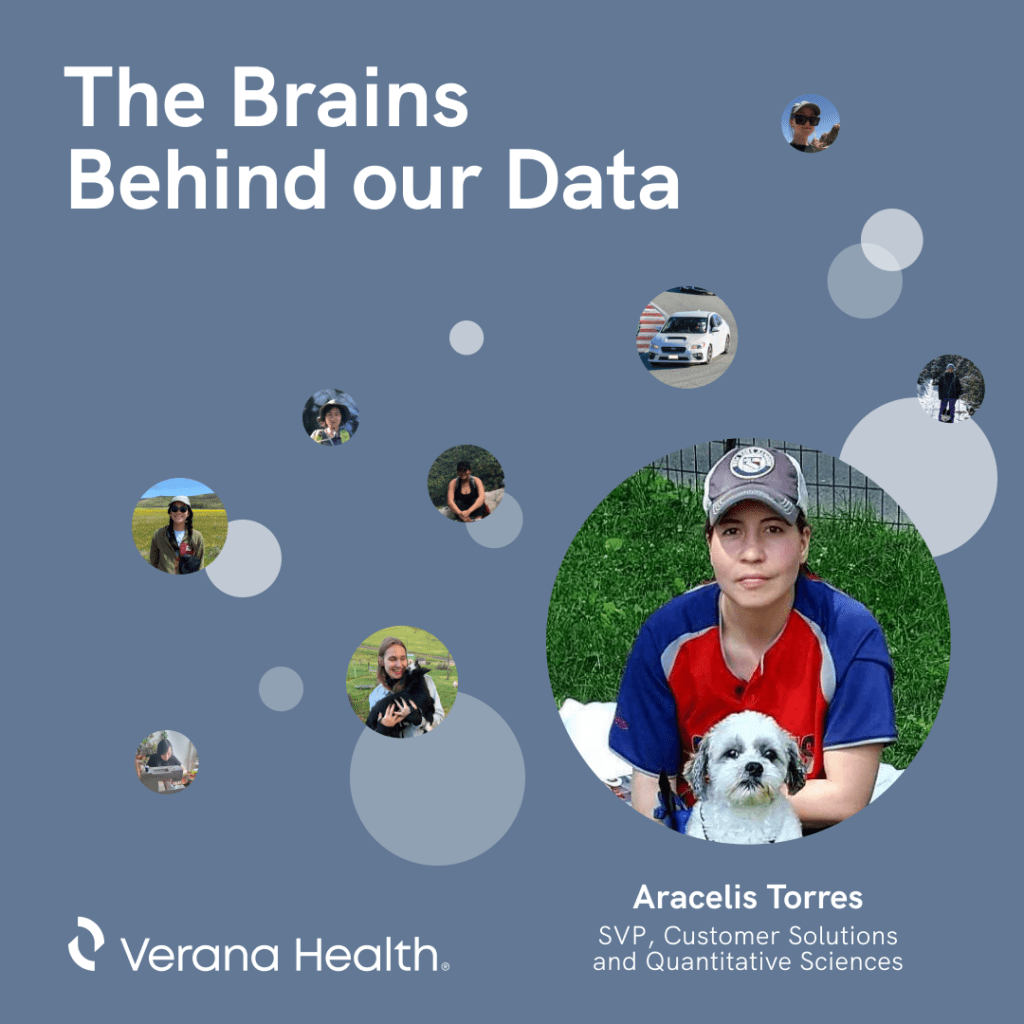Get to Know Our Quantitative Sciences Team: The Brains Behind Our Data (Aracelis Torres)
Author:
Verana Health
Verana Health has a team of more than 30 quantitative scientists who work toward the goal of producing high-quality, data-driven insights that can help inform research and improve patient outcomes.
In this blog series, we invite you to “Get to Know Our Quantitative Sciences Team: The Brains Behind Our Data.” Kicking off our series is Aracelis Torres, PhD, MPH, who leads Customer Solutions and Quantitative Sciences.
Q: How would you explain your role?
A: As senior vice president of the Customer Solutions and Quantitative Sciences department, I support two teams: One team drives the project management of services that Verana Health offers its life sciences customers; the other team provides technical, as well as methodological expertise, that enables our analytics offering, quality measure development, and fit-for-purpose Qdata® modules. These quantitative scientists consist of epidemiologists, biostatisticians, and data scientists. Together, we work cross-functionally and support organizing the vast amount of data into high-quality datasets that can be used for insights generation.
Q: What attracted you to the quantitative sciences field?
A: Epidemiology is the study of diseases and the factors that cause them within populations. The word ‘population’ is what initially drew me to the field. I have always been generally interested in healthcare, medicine, and numbers. The field of quantitative sciences provided a path to have an impact on a broader scale such that the most accurate, real-time information can get into the hands of patients and clinicians. I love working with data, not only because it involves trying to find meaningful patterns that address important answers, but also because the data represents patients and families that may be impacted by some sort of ailment. I am frequently reminded of a quote by Neil DeGrasse Tyson who highlighted being driven by two main philosophies: “Know more today about the world than I knew yesterday and lessen the suffering of others.” I truly feel that the quantitative sciences field enables accomplishing both.
Q: What attracted you to Verana Health?
A: I was drawn to Verana Health’s scale and breadth of data. The number of patients represented across the registries we currently partner with unlocks many opportunities to generate robust research that is impactful, including for rare diseases that may otherwise go unstudied because there is not enough information in other small datasets. I also find it exciting that Verana Health spans across three therapeutic areas: ophthalmology, urology, and neurology. Each specialty has its own set of considerations; however, Verana Health is also trying to understand the commonalities that are solvable by cross-cutting technology that can be applicable to various diseases. There are a lot of critical questions within healthcare that are in need of answers — in many cases, addressing those questions is dependent on organizing data quickly without sacrificing quality.
Q: What inspires you to do this work?
A: My aunt passed away from brain cancer when I was very young. During that time, there was not as wide of use of real-world evidence as there is today. I often reflect on whether things could have been different had there been more information or research readily available in the way we now talk about the healthcare data ecosystem. This role, and the work that we do at Verana Health, is an opportunity to make a difference in people’s lives, which is a huge motivating factor for me to do the best I can every day when I come into work.
Q: What is the most rewarding part of your job?
A: If I had to narrow it down, there are two things I would highlight that are rewarding about my job. One is the impact on patient care. Earlier this year, we had our company kickoff and Amy Dixon, a professional triathlete, was the guest speaker. She had lost her eyesight to a rare disease. During her presentation, she said, “Had your company existed 25 years ago, I would not be blind.” It is incredibly moving to hear directly from someone outside of the company their belief in the vision and mission. Those moments serve as constant reminder as to what we are trying to achieve. The second thing I find rewarding is observing, and hopefully contributing to (although you’ll have to ask the team directly, if that’s the case) the growth of our team members. It is incredibly rewarding when individuals within the department highlight something that they have learned about themselves, or a newly developed skill that they feel sets them up for success and can be applied now, or in future roles. I hope my team members feel as though we are helping to cultivate an environment that supports them on their journey of self-discovery across a variety of skills that are not solely technical.
Q: What advancements do you see in your field in the next 5 years?
A: Overall, there have been many meaningful advancements when thinking about healthcare data. Discussions pertaining to large language models have increased dramatically, and it is another powerful tool that can further augment a strong foundation of high-quality data. I am excited for the broader data landscape to make use of these cutting-edge approaches in a responsible and transparent way. Beyond innovations in artificial intelligence and machine learning, I think we will also continue to see the continued complementary nature of different data sources that enable a more comprehensive understanding of the patient journey. Important progress is being made in creating connections, within the healthcare data ecosystem, in a secure and compliant way that unlocks new answers to key factors that may help prevent or effectively treat diseases.
In her free time, Aracelis enjoys playing baseball.


Let's Accelerate Research Together
To learn more about Verana Health, please fill out the information below and our team will follow up with you as soon as possible.

